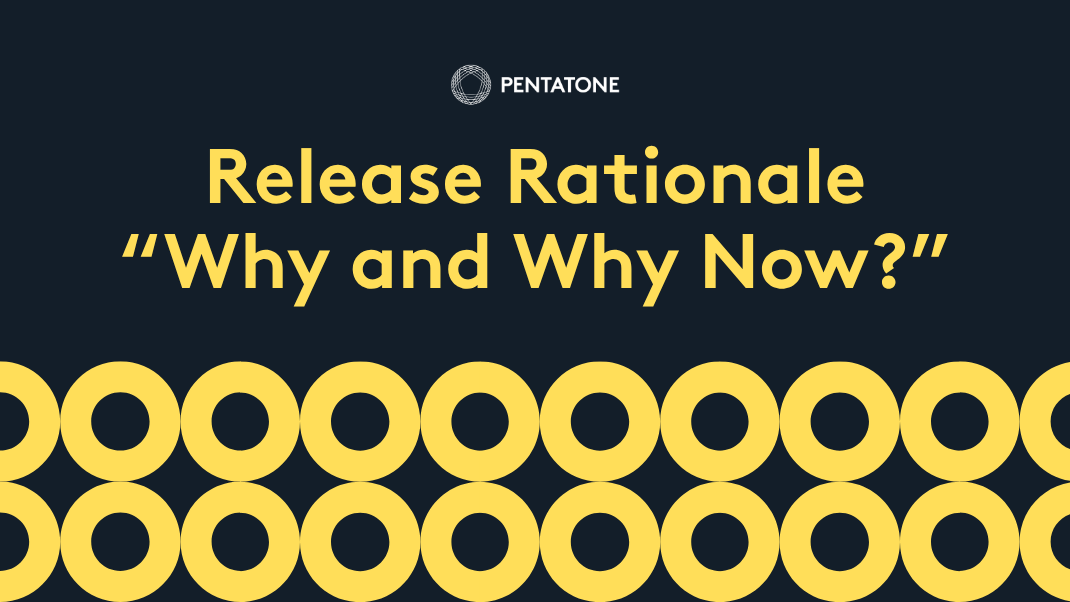“One must be convinced of the infallibility of one’s own fantasy” – Arnold Schoenberg
We at PENTATONE are fortunate to receive dozens of recording proposals every month, almost all of them deserving our consideration or at least review. We can only of course take on, and come to terms on, a tiny fraction of these proposals, and we have the longer-range strategy of pairing several of our most beloved artists with the repertoire that we happen to lack.
Our aim with A&R is to go both deep and wide. While we maintain a wishlist of desired repertoire and share it and discuss with artists, ensembles, choirs and orchestras, AND do a significant amount of scouting, the vast majority of project ideas come from the artists themselves (or their management). This is as it should be.
Any proposal must have storytelling at its heart. Additionally, the artist must ask himself two crucial questions:
Why? Why Now?
A third might be “why me?” but that is marginally less of a concern. If the first two questions are answered, then a recording proposal stands a far better chance of review. A project must also be able to articulate what makes it unique: whether that uniqueness comes from the instrument, the repertoire, the personal or historical connection, or the cultural or artistic timing.
It is important to note that a recording program should never be a concert program. In the latter, a piano recital might begin in the baroque or classical eras, tackle a weighty Romantic work, then move into the 20th century or something contemporary. A program of this nature would get lost in most cases and shows no imagination nor much consideration to the listener. That listener will find it easier to do absolutely anything else, whereas walking out of a crowded concert hall requires some effort.
Artists should also be aware that advance lead time is essential. A thoughtful proposal allows the necessary time to strategically arrange PR, marketing, communications, touring plans and timing strategy, all of which give a release its best chance to gain attention.
Follow PENTATONE and you will notice some lesser-known artists and ensembles making their recording debut, while some of our stalwart artists explore new and interesting areas. This is by design. We take all manner of things into consideration including subgenre, regionality, geography, era, and the particular artistic value each project brings to our catalog – and hopefully – the listener.
One can look at our catalog over the past couple of years and think that some releases are light on storytelling or purely centered on core classical repertoire. Others might look at challenging music such as Lachenmann and Boulez, Gershwin on accordion, or obscure though deserving solo saxophone music, and think the same. But each of the aforementioned projects were presented with a thoroughly fleshed-out story and a rationale for release, supported by concerts, touring, public speaking, strategic messaging via socials, and more. In some cases a particular artist or orchestra shows command of a certain repertoire and may bring something new and enriching.
The most thoughtful artists communicate their passion in their proposals as well as through the music itself. A strong 360-degree plan—touring, signings, appearances, and audience engagement—naturally strengthens the impact of any release. Fine examples of musical storytelling include Lara Downes’ Hold These Truths, the Miro Quartet’s Hearth, Tiffany Poon’s Nature, John Holiday’s Over My Head, and Sean Shibe’s Vesper.
I’m deeply suspicious of those who pitch us their “CD” idea. Paradoxically, these ,seem to come from younger artists, many of whom surely don’t own a compact disc nor a way to play one. A CD is a sound carrier or format. One’s project should be referred to as a “release”, “title” or “album”. However successful a CD may be in terms of sales, infinitely more will encounter any album via stream. Spotify has more than 700M monthly active users.
To understand the importance of a strong pitch, last year nearly 6000 classical titles were released commercially. According to the Recording Academy, the classical categories see the most entries. This of course makes the genre more competitive than others. Many of these releases contain what you might expect, an inexhaustible flow of Bach, Chopin and Beethoven, loads of close-miked una corda piano music, and many of the standards from the orchestral repertoire. What sets your project apart from the others? Why and why now?
PENTATONE endeavors works strategically across every step of the process, from recording to release planning and beyond, to ensure each recording can reach its full potential. A well‑considered proposal gives us the clarity to support the project fully and meaningfully.
PENTATONE aims to be the best classical music label in the world; but we recognize that that distinction can only be earned by us and awarded by you, the listener. Thanks for allowing us to take you on this journey.
Sean Hickey, Managing Director PENTATONE

